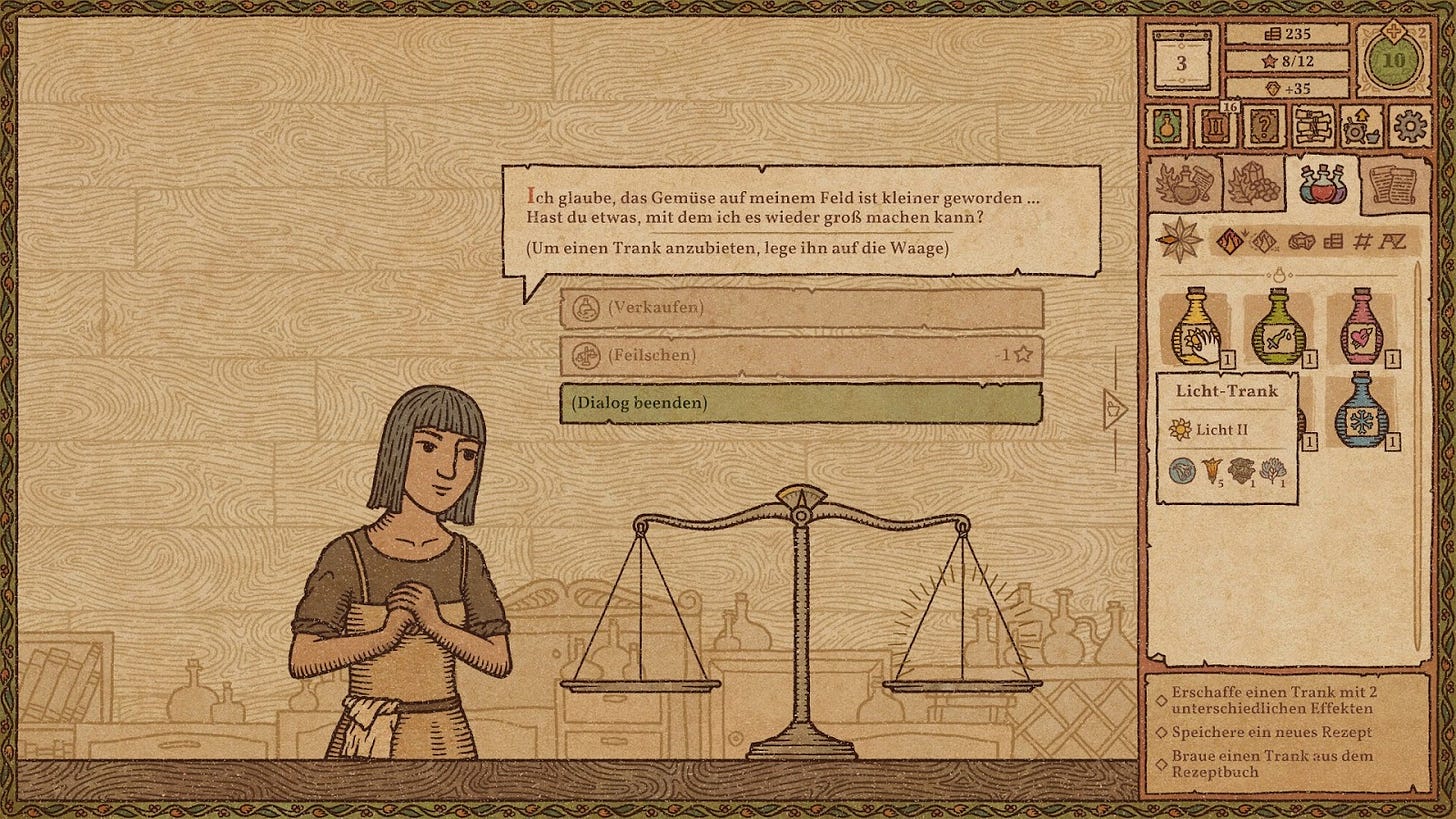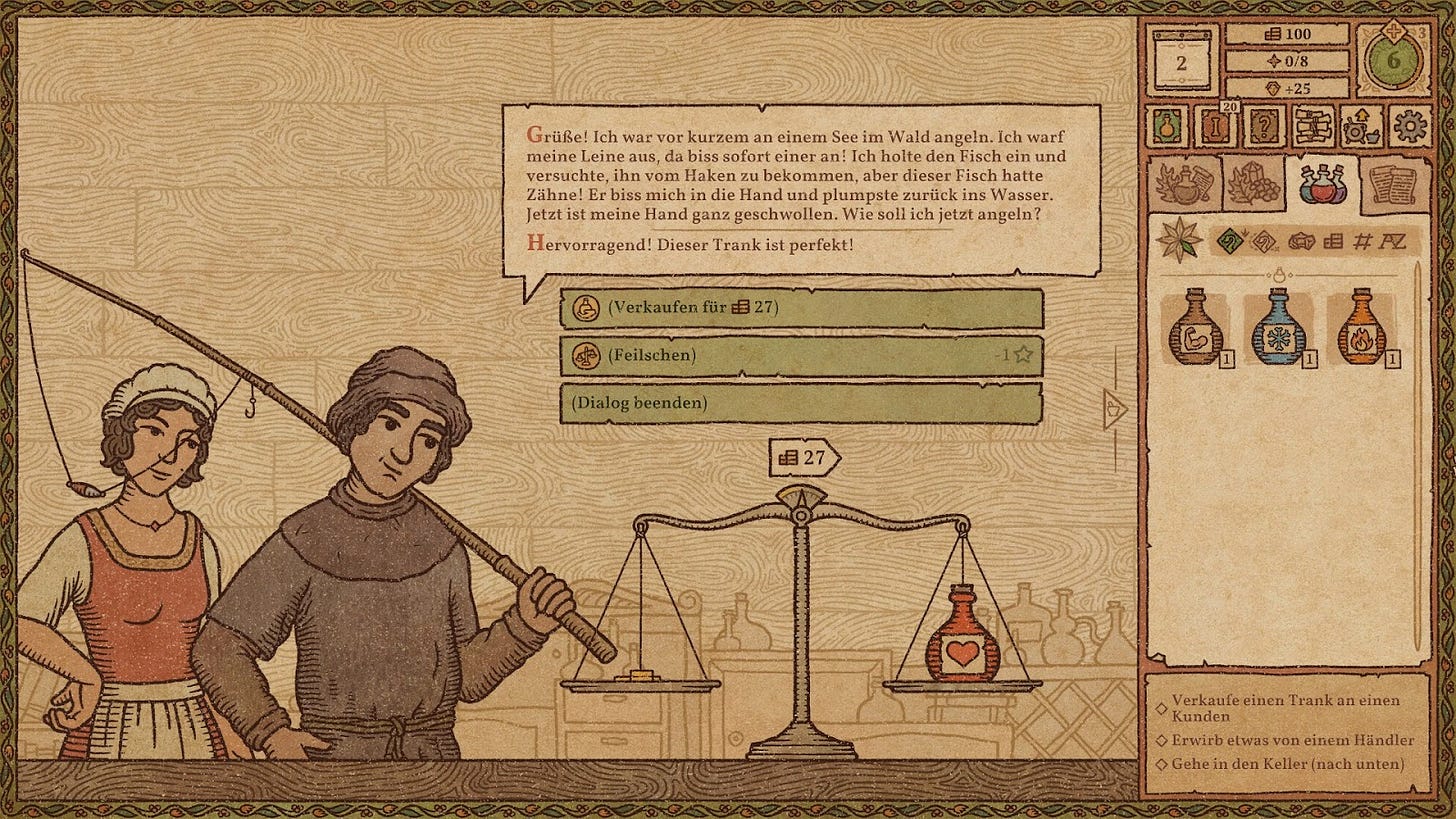Potion Craft: Alchemist Simulator is a cozy and effective way to practice a foreign language
But the grinding mechanics can make it feel tedious at times.
Interface: English, Russian, French, Italian, German, Spanish, Czech, Japanese, Korean, Polish, Brazilian Portuguese, Thai, Turkish, Simplified Chinese
Voiced audio: None
Hallo zusammen, for anyone who found this randomly, I’m a language learner using video games to learn a foreign language (German, in my case) and I’ve been blogging about it to keep me on it. This week I replayed Potion Craft: Alchemist Simulator in German and was pleasantly surprised at its language-learning usefulness.
Potion Craft: Alchemist Simulator is a cozy indie game that focuses on a (presumed male) alchemist who moves to a small town to run a small alchemy shop for the locals. A quintessential crafting game, Potion Craft has a unique puzzle-solving approach to the standard A + B + C formula of crafting games: in this game, potions are crafted by using different ingredients to chart across an alchemical plane. Since that’s a little hard to explain, this is a (low spoilers) example of how to craft a health potion from a YouTuber named Raddehc:
This game has been on my radar for a long time as a potential language-teaching game and I was honestly putting it off because I’ve really been trying to find useful games I hadn’t played in English.
However, after another long week of struggling to find games I felt qualified to evaluate, I found myself quarantined in my bedroom (luckily enough not for the traditional reason) and limited to studying with games that could be played on my laptop. So, I reinstalled this game, started a new save and changed the language to German.
And the experience was, to be honest, a little mid. The true joy of this game is discovering the geography of the alchemical plane (and maybe bonding with the local ingredient salespeople) and since I’d already done both in my English-playthrough, I wasn’t so excited to do things on my second playthrough. (Just to be clear, I did enjoy these things on my first playthrough! There is enjoyment in this game!)
The game can be repetitive, which is both good and bad
The main gameplay loop is creating potions for locals to buy ingredients to create more potions for locals and achieve some additional, “level up” goals. Since there’s only so many potions to be requested and only so many ways locals have been coded to request them, the gameplay can get a little repetitive, especially after 20 hours or so. (Though, also, I played badly! Remember to use recipe pages, especially when making difficult potions for the alchemical stones!)
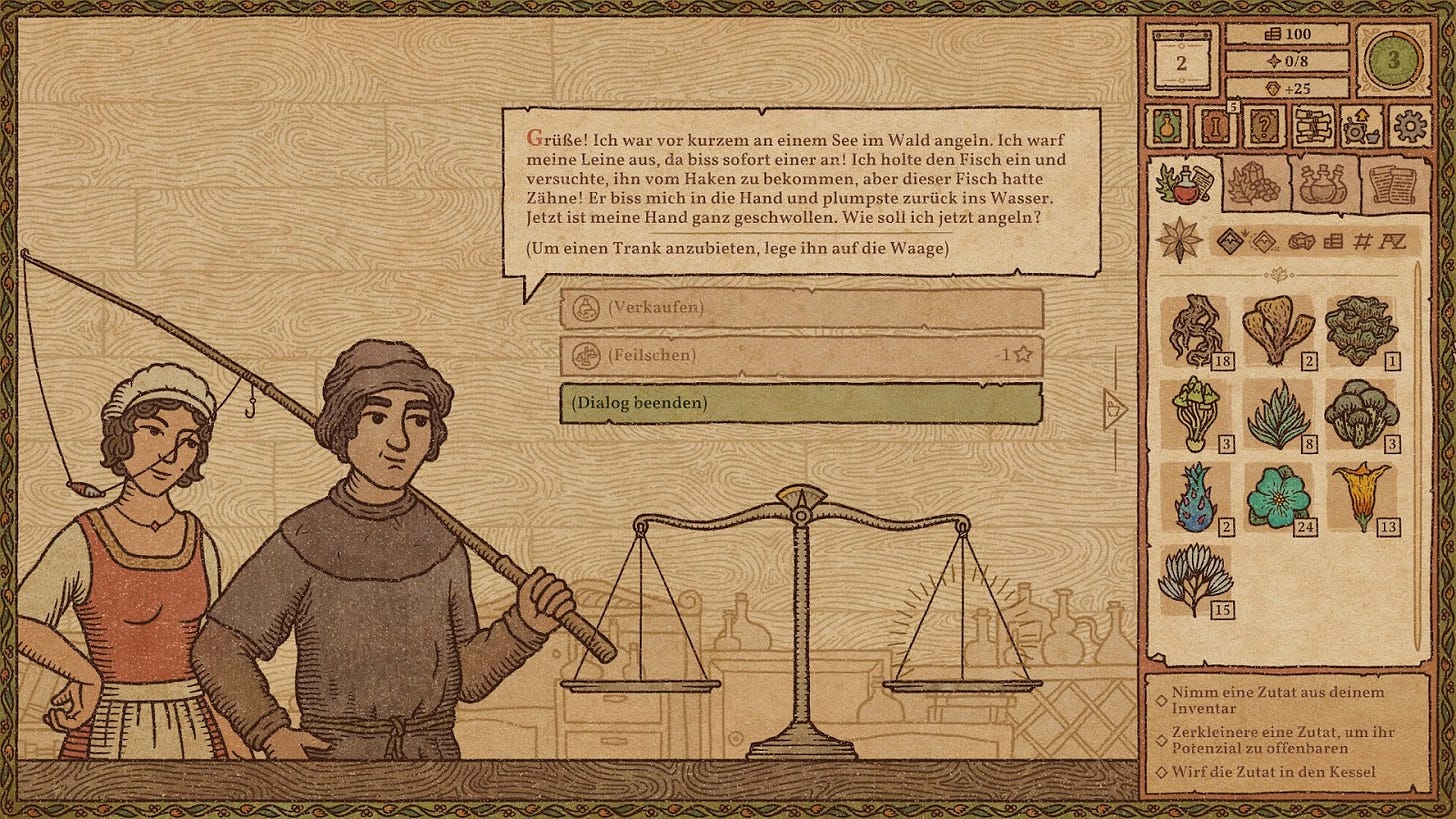
Helpfully, this also means the language used by the potion patrons is fairly regular as well and you’re likely to pick up a rhythm of decoding their sometimes veiled requests without too much problem (though I did occasionally confuse their requests even in my English playthrough).
I haven’t actually beaten the game because I got stuck on one difficult request back in my English playthrough and I just quit the game rather than redo it–I’ve told myself I’ll wait for the quality of life update the devs have promised (coming soon!) in hopes it makes the quality of my alchemical life better enough to finish the game.
Now I would have just shelved this game altogether and waited until the update to write a review but I realized early on in my second playthrough that this game can be useful for A1 players (!!!) and that’s just so rare and valuable that I decided it warranted an immediate review.
[For the past month I have been playing games, trying to focus on games that might benefit A1 students and it’s been tough. It’s been so tough.]
Sincerely, the music is a key component of this game’s language utility.
So not all A1 players will benefit, of course, and learning with this game almost certainly requires a little pocket dictionary or Google Translate app (maybe even a spreadsheet) but this is definitely a game that could be helpful. And even when it’s difficult and challenging, the beautiful artwork and soothing music should make that challenge all the more bearable.
Since Potion Craft depends on picking up what potions client’s are asking for, gamers of all language proficiency (who enjoy the central gameplay) will have a relaxing, rewarding way to practice fairly useful words that range from common (das Feuer) to uncommon (angehender) and while that’s kind of true for all text-based games, Potion Craft’s aesthetics and game mechanics have been intentionally designed to encourage players to take their time with the crafting puzzles, which encourages them, in kind, to take their time puzzling out any unfamiliar language in the game.
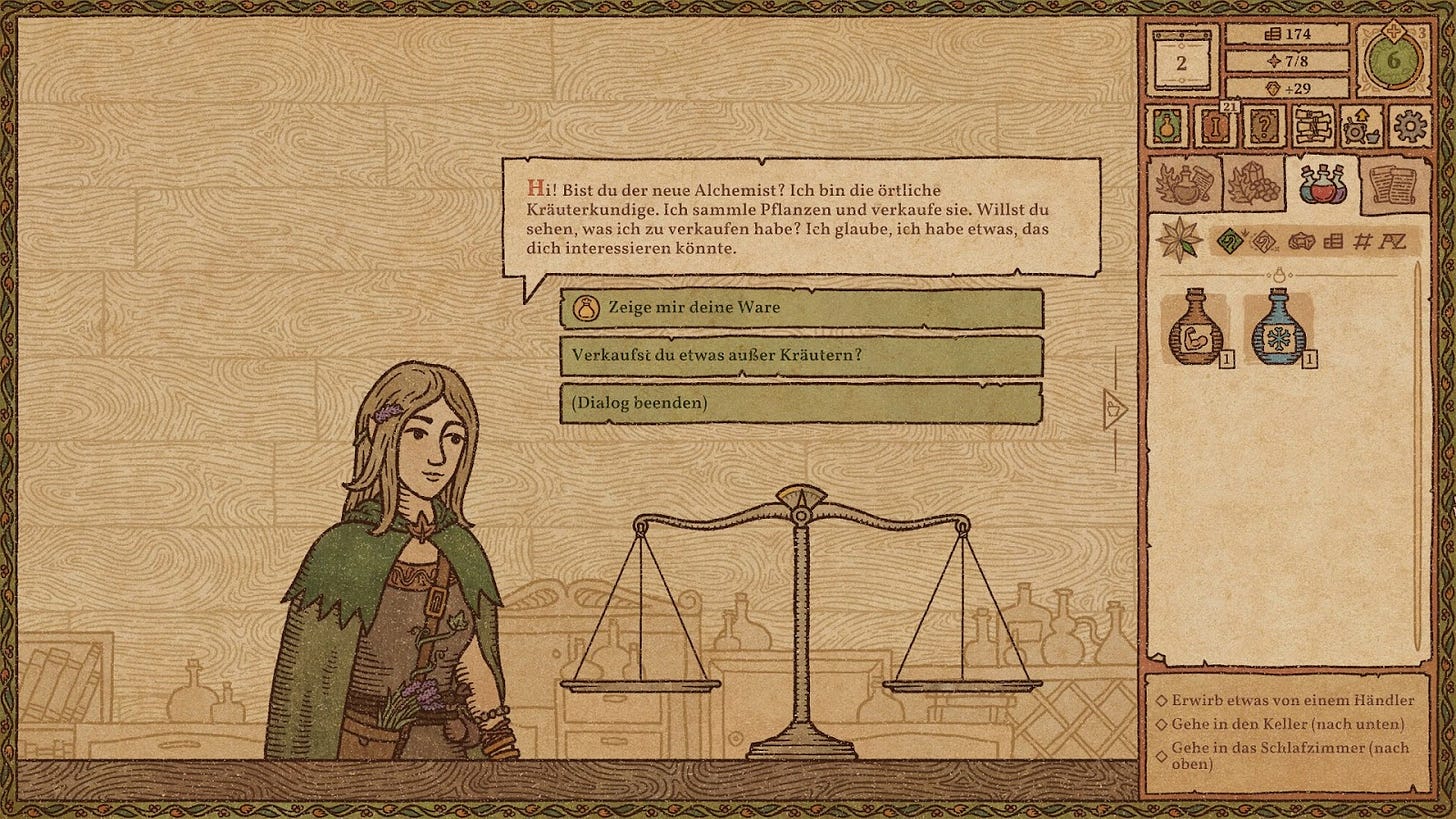
In comparison the stressful narrative and dramatic music of many other games make this stragedy feel kinda weird. For example, it didn’t feel appropriate to pause the conversation with Ketheric Thorm in my semi-German playthrough Baldur’s Gate 3 to look up exactly how I was criticizing him. The threat of (fantasy) violence and the excitement of ending his reign over the Shadowlands made it much more compelling to just start combat by clicking one of my player character’s dialogue options that beginning with “Nein!”
But in this game, where the shop queues are patient and the sun rises and sets at your command, it doesn’t feel strange at all to pull up a dictionary to check that the short-haired paladin in your shop is asking for a potion that resists fire instead of causing it.
And, of course, while symbolic language does not abound in this game, the few symbols in the game’s alchemical map and the potions they brew are helpful for orienting, especially new players. Health potions are represented with a heart; poison potions are represented with a dripping dagger, etc… and that creates a basic English-German dictionary for words like ‘health potion’ and ‘poison’.
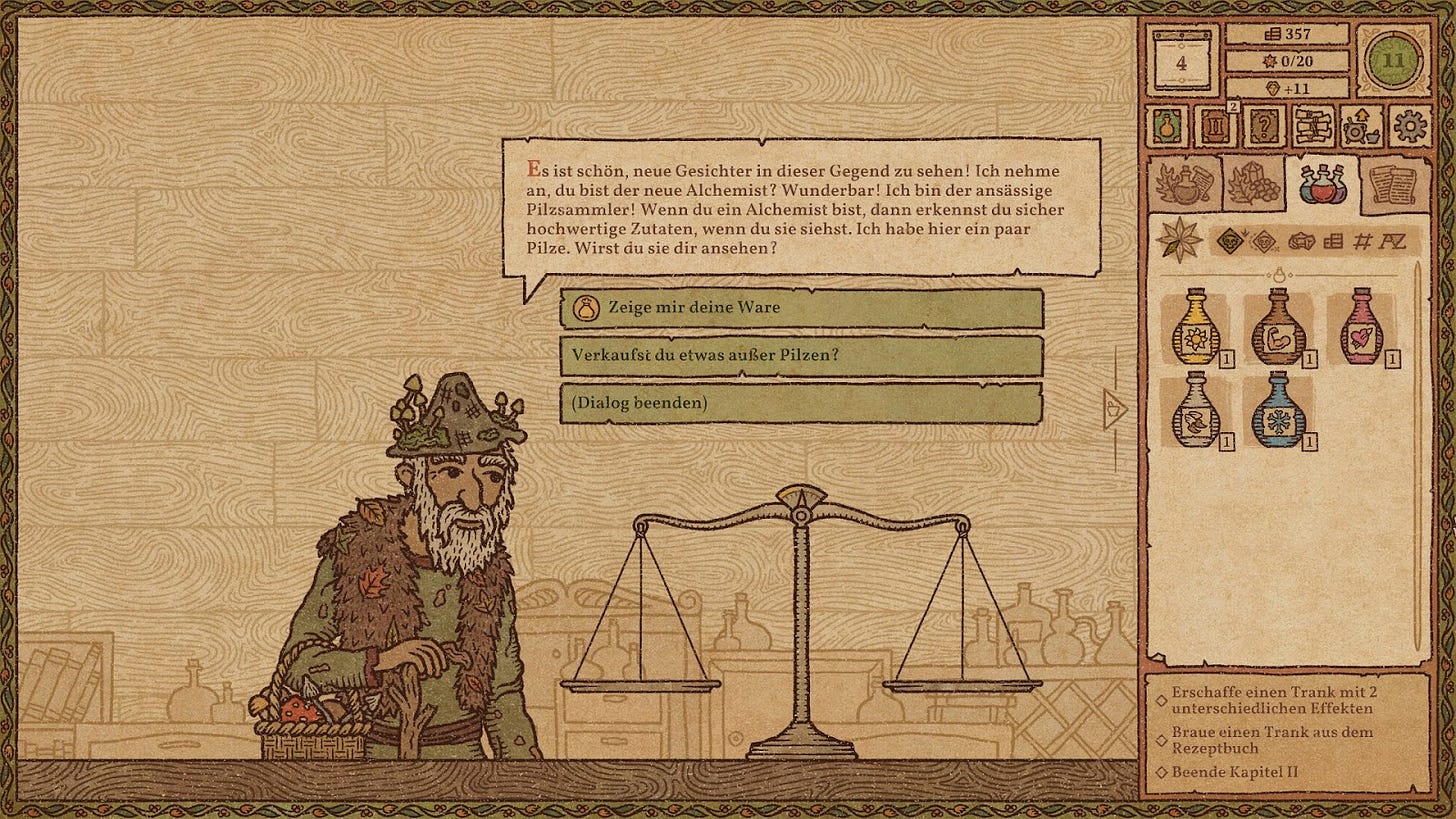
Even with all of this I probably wouldn’t be quite able to give the game a 3 star rating for A1 students, except for the fact that the answer key (at least for the most recent update) is fully-available online in English and Russian, which means if you’re able to pick up a few words you can keep likely figure out the full sentence with the guide online. And since that matching game is still a meaningful language exercise, I’m including it in the gameplay here.
This game would definitely be more useful for A2 students and B1 students (as most games are), but trust me when I say any game that can be helpful for an A1 language learner is a precious, precious resource.
My Complete CEFR ratings:
A1: Zwei Sterne (ü ü)
To me, a two star rating means a recommendation with caution and that’s how I feel about Potion Craft for A1 students. I was tempted to give this game three stars (general recommendation) because the pickings are so slim at the beginning of a language journey, but in the end I decided I couldn’t do it.
A2: Drei Sterne (ü ü ü)
This is likely the ideal language range to play this game, but that will depend a lot on the everyday vocabulary the student enters the game with (which can vary a lot in the A2 level). Again, the music tempted me to push it up to four stars, but the gameplay is so limited that I settled on three stars and this special shoutout.
B1, B2 & C1: Drei Sterne (ü ü ü)
While this could be a great tool and relaxing pastime, especially for fans of cozy games, I’d only really recommend B1-C1 students to include this game in their language practice if they’re focusing on improving their reading comprehension, since this game cannot offer much in the way of speaking and listening, which so many other games can offer to students at this level.
C2: Zwei Sterne (ü ü)
Ideally, C2 students are fairly comfortable with their reading skills and so this game probably wouldn’t be that helpful. And while it can be still be fun, I’d probably only recommend it as a confidence boost when confusing conversations or the immigration office make you feel insecure in your language abilities.
Finally a small note on accessibility:
This game is a little simple for a $20 price tag so that is something to consider, though sales or the upcoming update could radically impact that judgment. ESRB rated the game E10+ which I agree with, but I do think it’s worth mentioning that the game references off-screen fantasy violence, necromancy, libido and hallucinatory drugs. And while the hallucinogens could be considered Tolkien-esque, the occasional requests from disappointed husbands seeking out a potion to increase their wives libido could be eyebrow raising for many.
Also perhaps it is worth noting that this game is developed in Russia, and while I do not believe it is connected to the Russian state’s attempt to annex Ukraine via force in any way, I can imagine that there are some gamers out there who would rather purchase games that do not contribute to Russia’s cultural output or GDP in anyway and would prefer to know this at the jump.
I hope you enjoyed this review, trust me when I tell you I was delighted to feel like I had anything to offer A1 language students.
I hope to have more soon!
Tschüss!
Boudicca.



